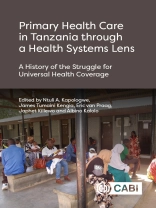Robust health care systems are paramount for the health, security, and prosperity of people and countries as a whole. This book provides for the first time a chronicle of the struggle for, and eventual success of, universal health coverage (UHC) in Tanzania. Beginning with an introduction to primary health care in the country, from its historical foundations to the major milestones of implementation, this book then considers stewardship of this important aspect of health systems over time. Written in a way to allow the application of lessons learned to other countries’ contexts, this book covers:
– Policy and governance issues such as leadership, human resources, and financing of health systems;
– Practical aspects of health system delivery, including supply chains, community care, new technologies, and the integration of services for particular population groups;
– The impact and mitigation of global events on health systems, such as resilience and preparedness in the light of disease outbreaks or climate change, and social, commercial, and political influences.
Concluding with a look to the future, forecasting the changes and new solutions needed to adapt to a changing world, this book is a valuable reference for policy makers, global health practitioners, health system managers, researchers, students, and all those with an interest in primary health care and reforms – both in Tanzania and beyond.
Tentang Penulis
Dr Albino Kalolo is a Senior Lecturer and Researcher in Public Health at St Francis University College of Health and Allied Sciences in Ifakara, Tanzania. He is currently involved in training medical students and other trainees in Epidemiology, Community Medicine and Research Methodology. His research work broadly encompasses developing people-centred social health protection initiatives, applying ecological approaches in health promotion, decolonizing global health partnerships, translating research evidence to policy and practice, use of digital solutions to improve the quality of health care providers and developing and evaluating health system strengthening interventions in the context of poor resource settings. In his research work, he applies implementation science research methodologies embracing participatory (mixed) methods. In the course of training and work, he has received several awards that strengthened his capacity in research and enhanced scientific productivity. Before joining the university, he served for six years in the Tanzanian district health system at the capacity of medical officer in charge of a district hospital and a District Medical Officer. He holds a Doctor of Medicine (MD) degree from the University of Dar es Salaam, a Master of Science (MSc) in Public Health from Maastricht University in the Netherlands and a Ph D in Public Health at the University of Heidelberg in Germany. Between 2019 to 2021, he joined the Global Health Equity Scholars (GHES) Program with the Health for a Prosperous Nation (HPON) and the University of California Berkeley.












